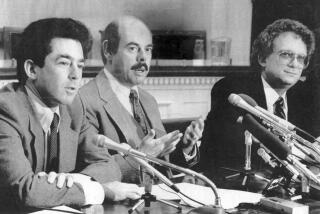Disavows Yankee-Baiting, Coziness With Castro : A Born-Again Manley Bids to Recapture Jamaica Vote
- Share via
KINGSTON, Jamaica — Opponents blamed his Yankee-baiting coziness with Cuba’s Fidel Castro and his radical-left economic policies for turning this lush island country into a business and tourist wasteland.
His bombastic support of “anti-imperialist” Third World causes such as the New International Economic Order bitterly soured relations with Jamaica’s traditional patrons, Britain and the United States.
His decisive failure to win reelection as prime minister in 1980 inspired celebrations in London and Washington and was later hailed by President Reagan as a defeat for communism and Castro.
That was the fiery left-wing Michael Manley of a decade ago.
Lost in a Landslide
Now, a self-described “new” Manley stands only an election day away from recapturing the office he lost in a landslide eight years ago to the conservative Edward Seaga.
According to political scientist Carl Stone, whose pre-election polls in Jamaica have never been wrong, Manley’s left-of-center People’s National Party is virtually certain to win the general election that is expected to be called sometime before the next tourist season begins in mid-December.
Ironically, Harvard-educated Seaga, the somewhat stiff and autocratic leader of the center-right Jamaica Labor Party, may lose because of his own success in turning the failing economy around. The task required eight years of unpopular austerity, paring the public payroll by 26,000, devaluing the currency by 70% and neglecting social services to pay the cost of “structural adjustments” made necessary by economic near-collapse under Manley.
‘Best Shape’ in 16 Years
Today, tourism is booming, unemployment is down and economic growth has become so rapid that Seaga has expressed fear of the economy overheating. Yet the very measures that put Jamaica in what he calls “the best shape for the past 16 years” have so deeply eroded Seaga’s popular base that his Labor Party trails Manley’s People’s Party by 16% in the Stone poll.
Another factor in the voter turnabout may be Manley’s success in selling himself to Jamaicans and foreign governments as the “New Michael Manley,” a political moderate who by his own description is light years away from the combative left-wing Manley of old.
“We have looked at it all and come up with a much more pragmatic view of what is possible,” the lanky, gray-haired Manley said in a recent interview with The Times, explaining what appears to be his ideological backflip.
“We’re going to put far greater reliance on market forces, entrepreneurship, small-business development, and try vigorously to promote an atmosphere that is supportive of that,” said the London School of Economics graduate whose last eight years in office featured nationalization of a major bank and businesses and a dismally unproductive attempt to create state communal farms.
Now ‘More Laid-Back’
Describing himself as “a more laid-back Manley,” the 63-year-old leader said his change followed a long period of reflection after the bloody 1980 election campaign in which 750 people died violently in clashes between gangs supporting the rival political parties.
“The first thing I said to myself was, ‘What the hell was it all about? We’re supposed to believe in democracy, the rule of law, the right of private capital, the right to make profits. We’re supposed to believe in human rights. What was it all about?’
” . . . I think the most important thing that happened to me then was to go back inside my own mental resources and put to myself the question: Were there some things we were attempting that were theoretical but not appropriate to the culture of this society? That’s the most fundamental intellectual development that I think took place for me.”
One of the inappropriate things, he said, was the intensity of his courtship of Castro, who at the peak of their relationship sent construction brigades to Jamaica to build schools. Manley said the United States “overreacted” to his relationship with Cuba, “and because of that we overreacted. . . . We became defiant about it, and that was a mistake.”
Nothing Provocative
Given another chance, Manley said, he will restore “seemly” diplomatic relations with Cuba, broken off by Seaga, but “it will be on a very moderate basis . . . not anything that would be provocative.”
Manley has worked hard for the past few years mending fences in Washington and London, wooing diplomats, politicians and international investors who were offended by his radical policies of the past. Now, he said, the British financial community accepts him, and while American bankers have been more skeptical, he is in close communication with David Rockefeller, chairman of the Chase Manhattan Bank’s International Advisory Committee, and has developed good relations with key people in the State Department.
To all, Manley said, he has candidly acknowledged the mistakes of his “democratic socialism” of the 1970s, including the attempt to create state farms.
“The state farms were a disaster,” he said, “an utter disaster from every point of view. You’d better believe we’re not going to propose any state farms this time around.”
More to Read
Sign up for Essential California
The most important California stories and recommendations in your inbox every morning.
You may occasionally receive promotional content from the Los Angeles Times.










